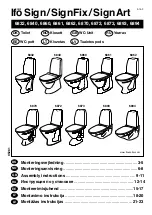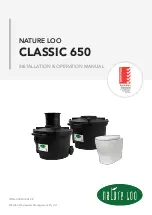
Page
What should be done if the area will be closed down for a while?
If the toilets will not be used for only a few days, we would recommend you keep the fan on, but if
the toilets are not to be used for a few weeks, the fan may be turned off. When you turn the fan
off, a smell may enter the room. However, this should be gone in a few hours, after the heat from
the composting process starts to push the gases up the vent on its own, or the fan is restarted on
return. It is also recommended that you add a dose of Bio-Stimulant down the pedestal before
closing down. This works to keep the right balance of bacteria whilst the system is not being used.
If there are too many flies in the composting chamber.
Generally, flies are attracted by excessive amounts of carbon dioxide and methane, which is a
result of anaerobic bacteria indicating that the composting pile is too moist, there is not enough
heat or the wrong things have been dropped down the pedestal.
A few flies may be part of the process and may be helpful, but if they become a nuisance they can
be dealt with.
•
First check all the other ventilation systems (fan etc.) are working properly. and that liquid
drainage and evaporation is adequate.
• Commence using a bulking regime to aerate the pile. This allows more air through the pile and
will increase aerobic activity and evaporation.
•
The most effective way to kill the flies is by using the Rota-Loo Bio-Stimulant. Bio-Stimulant
helps the compost pile by increasing and sustaining a higher metabolic rate of aerobic
bacteria, therefore increasing the compost rate and producing less gases to attract the flies.
• It is also recommended that a pyrethrum (natural insect repellent) spray or powder be added
to the pile and the bin rotated. Two tablespoons of boracic acid can also work.
•
Another option to kill these flies is by pouring boiling water down the waste chute. The boiling
water kills the larvae and stops the breeding cycle. About 4 litres of boiling water down the
chute, everyday for about 14 days is required. Make sure you have a drainage system in place
first.
•
If flies are still present and all methods have failed, it would be worthwhile emptying all bins
and flushing the whole system out with water. This will allow you to start afresh.
16
Sphaeroceridae are a family of true flies in the order Diptera,
often called small dung flies The larvae are microbial grazers
found in abundance in many micro environments with
decomposing organic material. Most species appear to be
associated with decaying plants or fungi and they are a part
of the nutrient cycle. Many species are associated with various
kinds of faeces including human faeces. Sphaerocerids
may abound in decomposer communities such as compost
and manure.
Vinegar Flies or Ferment Flies are a small, yellowish fly
(3- 4mm) with distinct red eyes and are commonly seen
around rotting fruit. The Vinegar Fly is not actually a
fruit fly as it does not feed on fruit directly, just the yeasts
associated with rotting fruit. They are common in homes
and restaurants and wherever food is allowed to rot and
ferment. With a life cycle of 1 week and the ability to lay
500 eggs, they can become very plentiful very quickly.
TROUBLE SHOOTING - Cont...

































